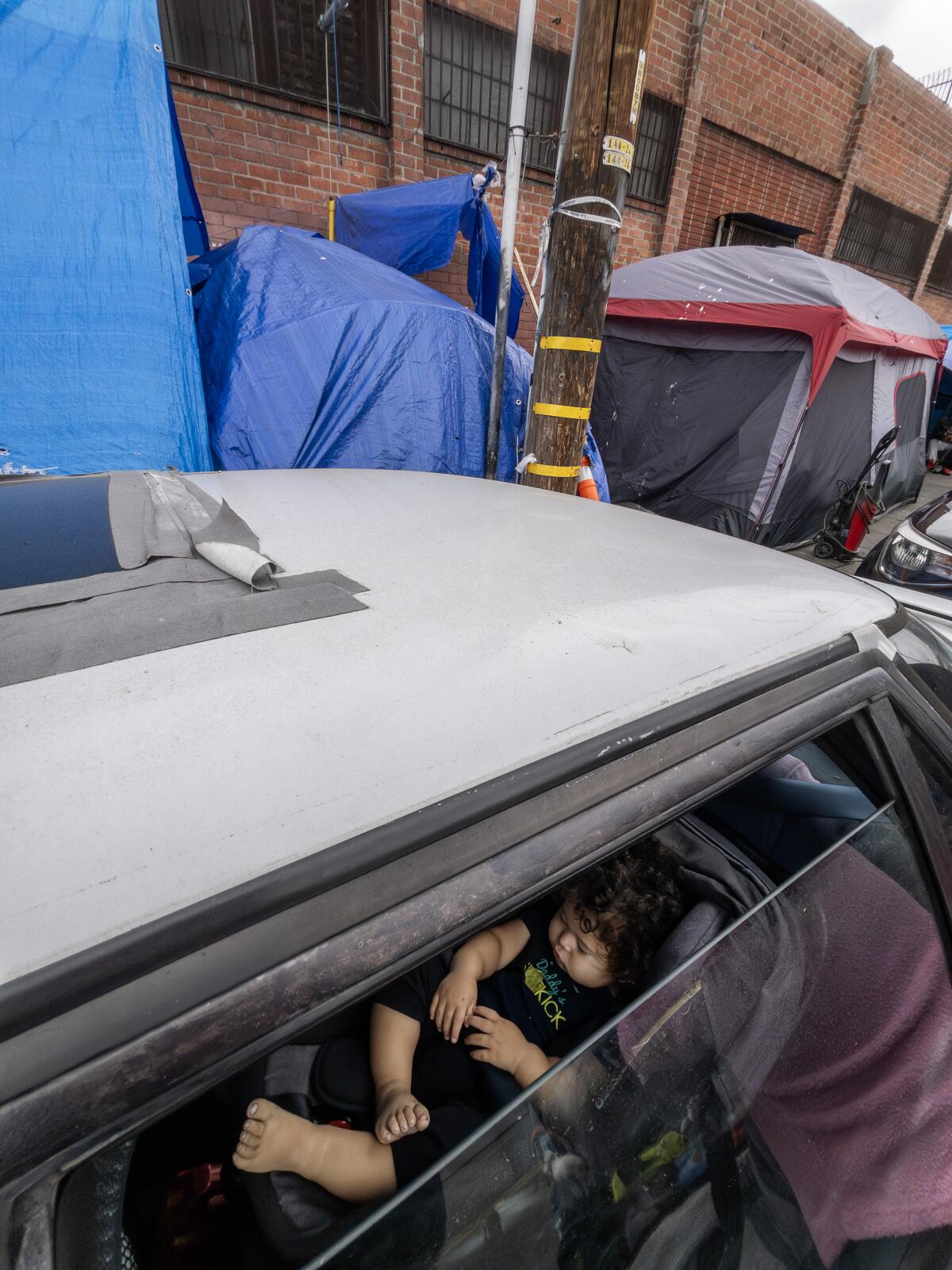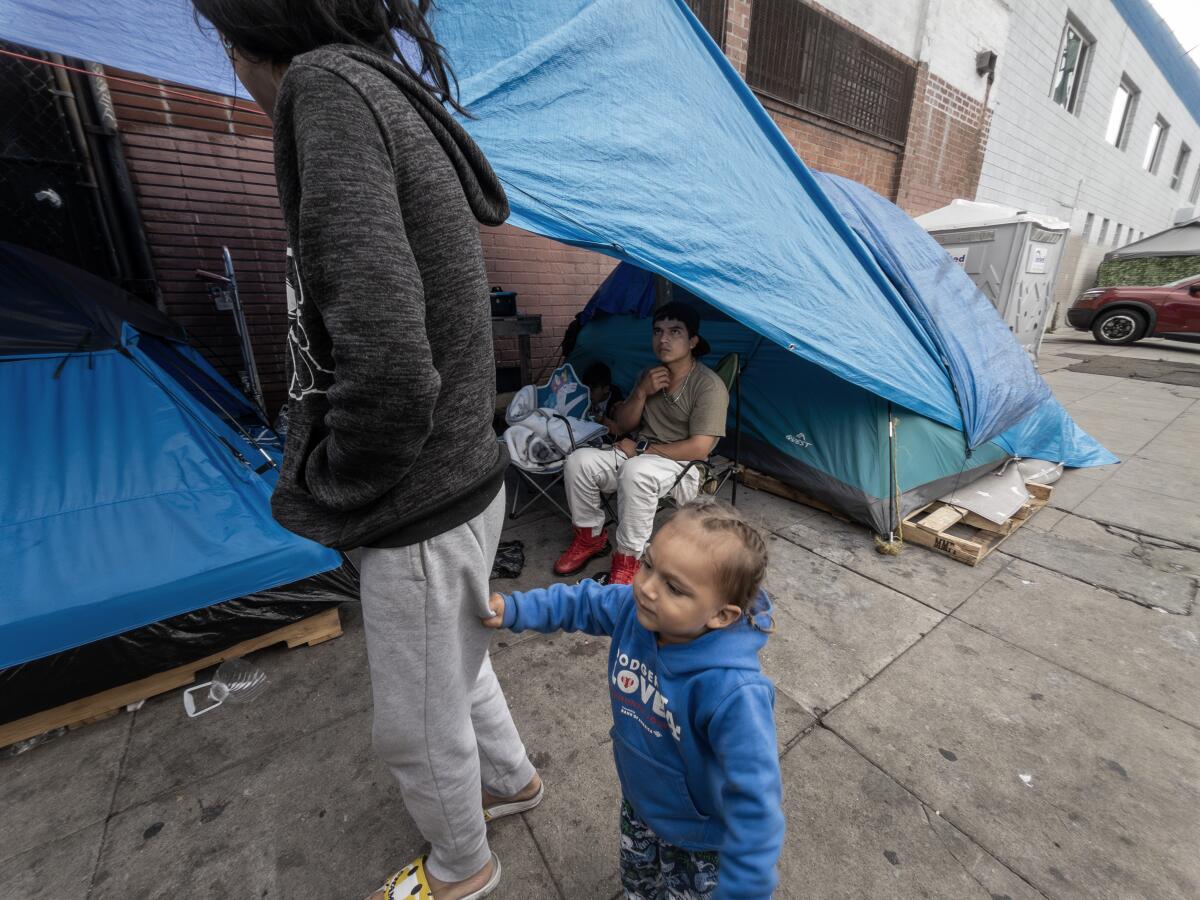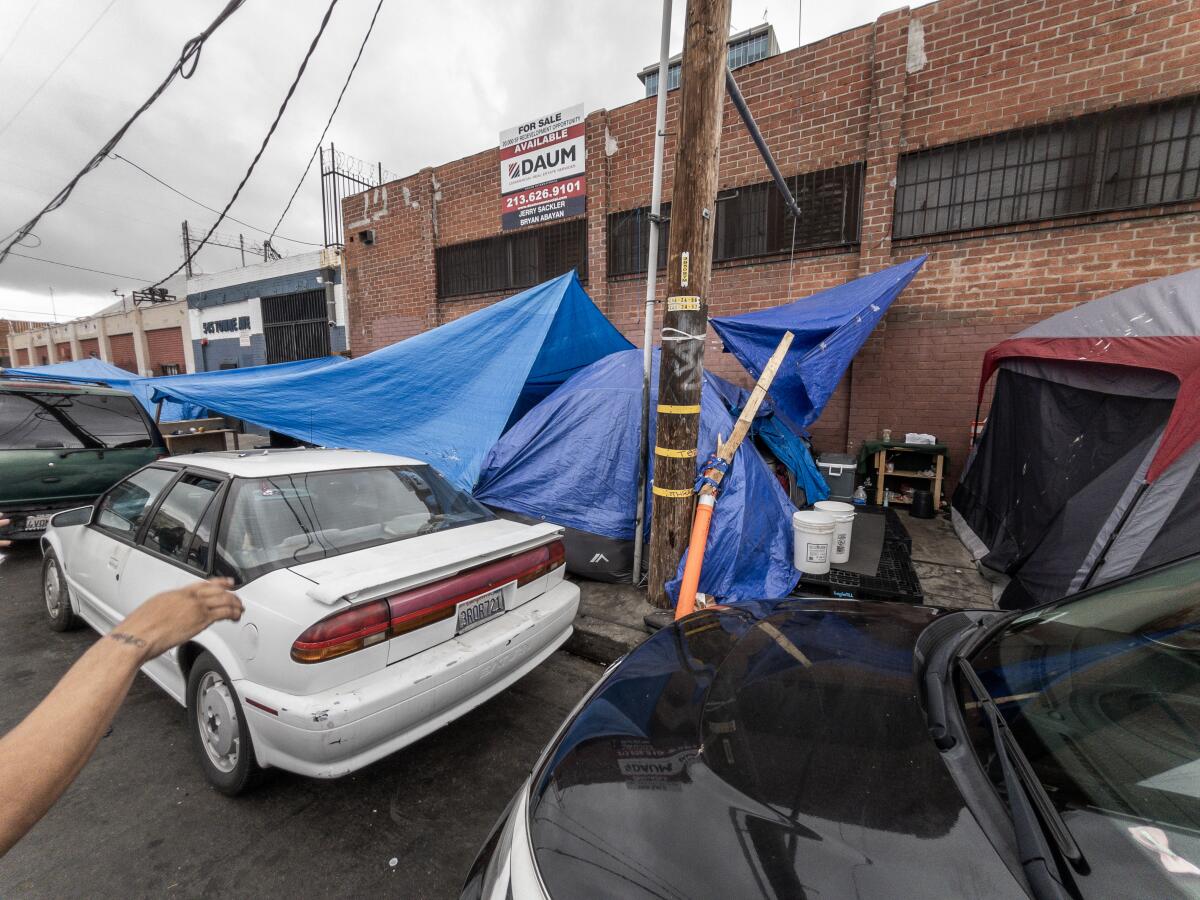
This article is more than
1 year old
Skid Row is a playground for children again, despite homeless officials’ assurances that it wouldn’t happen.
On Thursday morning, a 2-year-old rode a broom like a horse, running past a tent, where he lives with his parents. His 5-year-old friend, who lives in the tent next door, ran alongside him.
A 9-year-old emerged from her own family’s tent to show her mother how she’d styled her hair with beaded clips.And a 1-year-old boy slept inside a car, his father trying to keep him from the cold in his family’s tent.

Just over a month after a Times report on migrant families with children living on Skid Row prompted authorities to rush several families into a motel, a more extensive community has formed on Towne Avenue, with at least seven new families, with at least 10 children, living in an array of large tents, pup tents and tarp shelters.
Some of the families said they had been there for days. Others said it had been weeks.
Although several families told The Times that outreach workers told them housing wasn’t available, county officials say that they offered “immediately available interim housing” to families in the area, but that some chose to decline it.
Homeless authorities have asserted that they have readied resources to immediately identify and find appropriate shelter for families with children on Skid Row.
In response to The Times report, Cheri Todoroff, executive director of Los Angeles County’s Homeless Initiative, told the county Board of Supervisors during an April 9 meeting that “outreach teams who are on Skid Row are able to immediately identify families who they are seeing unsheltered on Skid Row, and they have the resources available to bring those families inside immediately, on the same day.”
Officials told the supervisors there has been a 45% increase in the number of families in the homeless system compared with last year.
“It has grown increasingly apparent in the day-to-day efforts of providers, front-line staff … that there are increasing numbers of unsheltered families in the county,” Todoroff said. “Our teams are working quickly to determine if this is a new norm or a one-time surge.”
The Homeless Initiative issued a statement Thursday saying it is “deeply concerning to see families, especially with young children, experiencing unsheltered homelessness on Skid Row” but contending that every family engaged by outreach workers in the area has been offered immediately available interim housing.
“These opportunities are entirely voluntary, and they may not feel that the housing option available that day meets their unique needs,” the statement said. “Unfortunately, some have chosen to decline it. We and our service partners will continue to engage with these families to bring them inside and resolve their homelessness as quickly as possible given their individual circumstances.”
The families living on Towne Avenue this week came from Ecuador, Peru, Colombia and Venezuela and entered the U.S. in Texas and Arizona. Some said they arrived in Los Angeles on buses and airplanes that were paid for by people they did not know. Others paid their own way, thinking they would find opportunity in L.A.
Members of three families said they had been staying at Union Rescue Mission for about three months, until they were asked to pay a monthly fee they could not afford. The parents said they do not have permits that allow them to legally earn money in the country.
Currently, migrants make up about 75% of the 400 family members at the mission. Last year, facing financial stress, the mission established a policy requiring residents who stayed 90 days or more to pay a fee.
But Jeff Hudson, the mission’s interim chief executive, denied that anyone is required to leave for nonpayment.
“It is antithetical to what we do to put people out on the street,” Hudson said.
The only reasons anyone would be evicted would be violence or drug or alcohol use, he said.
“If somebody can’t pay, we will find them someplace else to go. They will not be put out on the street. It wouldn’t make sense. The term ‘migrant’ is irrelevant to us. Any women and children on the street we want off the street.”
Hudson said he could not talk about individual clients, but speculated that people might leave out of a sense of honor when they couldn’t pay, or because they saw the street as a better pathway to a housing voucher than the mission, which has no access to public support.
“When the city declares us a sanctuary city and they will say to URM, ‘We will not give you any support because you [prohibit substance use] and you are faith based,’ it squeezes us at both ends,” he said.
During the April 9 board meeting, Va Lecia Adams Kellum, chief executive of the Los Angeles Homeless Services Authority, told the board that a plan was being worked out to help subsidize the families at the shelter.
“We’ve made some headway.” Adams Kellum said. “We have a team out right now because we’ve learned that some of the families that went to the mission don’t have the money to pay the rates. It’s minimal to some of us. But to some families it’s impossible to consider.
“So LAHSA is going to start paying that fee in partnership with H.I. [the Homeless Initiative] so that there’s no barrier for families staying indoors while we’re working on a more permanent plan. I’ve asked teams to remain stationed out on Skid Row to look for those families. … We’re meeting with the missions to ensure that we can be that support and also keeping the motels aware that we may have last-minute urgent needs.”
LAHSA issued a statement Thursday saying that for several weeks, it has maintained its focus on Skid Row to identify unsheltered families and place them in interim housing as quickly as possible.
“So far, we have moved 30 families living on Skid Row into motels and seven into a building operated by a collaboration between Downtown Women’s Center and LAHSA,” it said.

“Some of the families we have encountered left Union Rescue Mission and we are working with them to bring them back inside. LAHSA has offered to cover the dues for nine families, but all have declined so far. Since the family system is overstretched, we have temporarily placed those families in motels while we work on alternative options to keep them sheltered.
“LAHSA is working with several partners to increase its resources to support these families, including identifying additional staff and discussing opening an additional space for families at Union Rescue Mission.”
Migrants regularly arrive at Union Rescue Mission, the only open door for families on Skid Row in a severely overburdened and disjointed system.
It’s the only crisis shelter where people can be accepted without referral from a provider, but it’s not connected to the county system, said Avian Weiswerda, clinical coordinator for mental health and homeless services at the nonprofit Para Los Niños, which has hundreds of clients on Skid Row.
The influx of migrants is a new stress that is causing new cracks, Weiswerda said. “But as long as I’ve been at Para Los Niños, those cracks have always been there. I wouldn’t say the system worked well or flawless before this.”
“There isn’t enough crisis shelter, crisis support, transitional shelter or permanent housing,” she said, which causes families to stay too long in transitional shelter.
Alejandra Lozada said she landed on Skid Row after she was asked to pay $370 to remain at Union Rescue Mission with her husband and 2-year-old daughter, Flavia.
“I didn’t have money to pay,” she said.
In lieu of the fee, she was told, she could work as a volunteer doing cleaning shifts at night to cover the amount, but she could not do it because she didn’t have anywhere to leave her toddler, she said.
She has applied to dozens of job agencies but never gets called back because she doesn’t have a work permit, she said.
Since they ended up on the street two blocks from the shelter, aid workers have come by but told them there is no place for them to go. “Right now there’s no help,” Lozada said.
Sometimes people come by and tell them their kids are going to be taken away if they don’t get off the street, she said.
“We’re on the street because we don’t have anywhere to live, not because we’re doing anything bad.”
On Thursday, the families living on Towne received a social call from Glenda Bustamante, who dropped by with two babies in a stroller. She said she has been at the mission for a year and pays $200 monthly that she raises by babysitting for other parents who work.
Though they are not eligible to work legally, some parents do find informal jobs as day laborers, babysitters, dishwashers or street vendors, she said.
Jhon Valencia and Katherine Gonzalez and their 2-year-old, Thian, came on a bus from Texas routed through Denver.
Gonzalez, who was watching over two other children, 5 and 2, while their mother worked, said she and her son had left the mission last week after being asked to pay $300 a month.

They joined others who had relocated to the area across the street from the Skid Row Community Refresh Spot, where they could shower and do laundry.
On Thursday morning, Gonzalez fried an egg on a burner while Thian sat in a child’s camping chair, watching videos on a phone.
She needs work and a place to stay, she said.
“With a home and a job, we can move ahead,” she said.
Yuhendry Carrasquero, whose 1-year-old son slept in a car in the morning, said that he works in plumbing, taking jobs when he can, but that the work is unstable.
He and his family have been on and off the streets since November, he said. Sometimes, when he earns enough money, they rent a room or stay at a motel. For now, they’re in a tent. On Thursday, Carrasquero said his wife had gone out to local agencies to ask about housing while he stayed with their baby.
At the south end of the tent row, Dori Mera shares a tent with her husband and daughters, 9 and 10.
She said she left the mission voluntarily, at first to stay with her brother, who was sick and living on the street. She thought she had permission to leave temporarily, but when she tried to return she was told she was no longer able to, she said. Recently, workers have told her she can go back, but she said she’s no longer comfortable there.
Her husband has a temporary dish-washing job at a restaurant filling in for a friend who is sick. He earns enough to buy food.
“The only thing we want is the chance to work,” she said. “An apartment, something stable to be able to work.”
“We just need a little push, and we can take care of the rest. We came here to work,” she said.